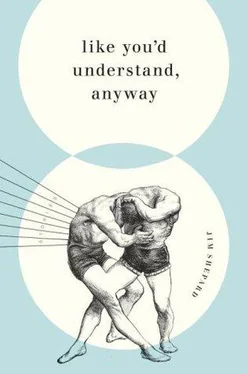He was already forced to spend time in my company, responsible for ensuring that I arrived, daily, at alphabet lessons and music. When he came of age at sixteen, I marched alone with other boys in ranks from the music master's house to the physical trainer's palaestra. I sang “Pallas, Terrible Stormer of Cities” and “Ajax on His Rock” and played the hedgehog game. I missed him. At home in the afternoon, where I was allowed to watch him play knucklebones or wrestle Anacreon, I sang and resang songs for him. I pretended that I was also sixteen.
That year he commissioned a first helmet like our father's, a variant on the Corinthian design. I was permitted to lift it from its peg and run my palms through the brush of its crest. I coped with the excitement by breathing through my mouth.
And my head was becoming an open gate that the world streamed through. Brothers muscles honey wine stones. Honey brothers muscles stones wine.
He lost patience with me again because of it. In the afternoons they shut me into the outer courtyard, but I followed their games by keeping my eye to the gate latch. They played at quail-tapping. The bird when rapped on its head sometimes stood its ground and sometimes backed out of the ring. They cheered it on or cheated by scaring it, exchanging coins on the basis of its behavior. I watched and sang battlefield paeans and imagined civic crises that would call forth a muster of even the youngest boys.
Anacreon loved the sea and spent his free time assisting the fishing fleet. Kynegeiros helped, but sometimes went his own way. When he did, I followed, reciting lists like figs, limes, almonds, olives, and lemons that soothed me and displaced the pressure of other lists that, arrayed in squadrons, so unsettled my brother. To lose me he leapt walls or rushed up high, gravelly hillsides. When he succeeded, my day was ruined. Eventually I'd continue on, miserable. I'd follow flying beetles riding the hot air up those same hillsides, or investigate the drowsings of hornets.
When I found him again, our eyes met like bones jarred in sockets. What did I want? , he'd demand, and again disappear. I always wondered, by what miracle was the dust and the rock around me transformed into speech? When he talked to me it was like a duet in which the other voice was silent. When I thought of him it was like a sign from god that I wasn't ready to read.
But whenever he talked to Anacreon about me, he'd say, My Aeschylus this, and My Aeschylus that. Anacreon spoke to him of me the same way: Your Aeschylus this, Your Aeschylus that.
Our decision to wait six days was not unanimous. Every knot of two or more citizens has become a discussion group. Hellenes have, after all, made arguing black is white a sport. My brother and I when not engaged in drill have walked the shoreline, both for training and to keep our own counsel. Sometimes we walk until Phosphorus, the morning star and light-bearer, leaves Hesperus, evening and western star, behind. Should we have stayed behind our city walls? Could we continue to wait for the Spartans? Should we have attacked while more of the enemy was disembarking? And why had they waited? Concern for their cavalry and its vulnerability to our camp's shelter in the sacred grove? Or were we drawn here, so that our city could be betrayed and given over, like Eretria? The last three nights there's been a waxing moon above the bay. When it wanes, the Spartans' Karneian festival will end and they'll begin their march to us. We walk every night through the wavelets combing in onto the sand. We walk until the watch fires are banked down. Stretches of the shore are a seafarer's junkyard, with stove-in and disintegrating small boats offering up their salt-eaten and mealy spare parts along the high-tide mark.
Anacreon died of septic misfortune seven years ago following a wound from snapped spears in the campaign against Aigina. He died in our house, a week after having been carried home on a litter. For weeks Kynegeiros seemed enraged at the sight of me. And my own expressions of sadness incited him further.
We groped in the murk of the gods' motives. All we knew was that their directives needed no explanation and had to be obeyed. Artemis is angry: Agamemnon must sacrifice his daughter. Mene-laus is favored: Troy must fall. And when a mortal is taken into a god's confidence, that mortal brings everyone bad fortune.
We consulted a local oracle, though our mother hated oracles, with their language tricks and teasing word-mazes. We were told that human life was a nursery in which larger designs were revealed. We were told that we had brought this on ourselves. We were told to look to the youngest. I am the youngest.
Our father for years said with pride that parents live on in their children and that the dead man rises in his offspring. He said, whenever he watched Anacreon on the parade ground, that he was like the gods' medicine, applied with kind intention. He called him the pillar for our roof. Our mother always chided us to remember that we were rich; that heaven's grace had been poured over us.
We drained and washed his wound and packed it with the prescribed herbs. A surgeon bled him. We waited, sitting about as a family through long evenings like the crew of a galley in an onshore wind, sullen and becalmed.
But with him the gods' verdict was suffering followed by death. As if our natural condition were a world without mercy. Our hope dwindled for seven days and then was gone. We were left with our father on his knees and the greasy reek of our brother's infected clothing on a courtyard pyre. Our mother became like Queen Procne, who lost her son and then, transformed into a nightingale, forever sang his name. She went about laureled with misery.
Kynegeiros too went about like a blind man. But my feelings were like chalk drawings, and if my father had known he would have flogged me raw. I cut my hair to crown my brother's tomb. I helped pour the offering. But how could I make my prayers? What words could I pour into his absence? And from which brother did I want forgiveness?
My surviving brother seemed to know. He looked at me as if he understood that in my case, conceit and vanity would never abate. As if he could see now that I was Catastrophe, hand-reared at home.
Why did our family act like this? I asked my brother in frustration almost a year ago. Our parents had still not recovered. By then I understood the old saying that grief is a cold hearth.
Others had lives much more filled with grief. Families that had blow after blow rained upon their reeling heads. What was different about ours?
The question has always been an unwise one to ask.
Each night on this plain in front of the invader, sharing with me a sleeping palette damp and cold with dew, my brother lies awake despite his exhaustion, still grieving for our brother and still refusing me forgiveness for having been spared.
Poison sweet waters once and they're poisoned for good. I don't ask him for his thoughts. Calamity is my school, and in it I've learned when to speak and when to keep silent.
By the third watch, it feels as though I'm the only one awake. My cloak, when it covers my feet, doesn't cover my shoulders. Under the wood smoke I can smell marjoram and pine resin. In the distance there's some quiet sentry-stirring in the dark.
When I lie awake on my mat, I compose. I sing about discipline and a good heart, which is not the same as having had either. Though I made my debut at the city Dionysia festival at the age of twenty-two, I did not win the prize until fifteen years later.
Our family belongs to the eupatridae, heir of an aristocratic lineage extending back to the origins of Attica. My brother and I are old enough to remember the tyranny of Hippias and to have voted on Kleisthenes's democratic reforms. We're considered men of some moment, having had a foot in both worlds. My neighbors admire me for what they've seen during the festivals, and they admire my brother for what they know of his spirit. My children hold him up as their model for fiercely applied self-discipline. He doesn't disappoint them. This evening for his supper while I cooked he contented himself with the kind of hard flax seed loaf that's fit mostly for winter boot insulation.
Читать дальше












